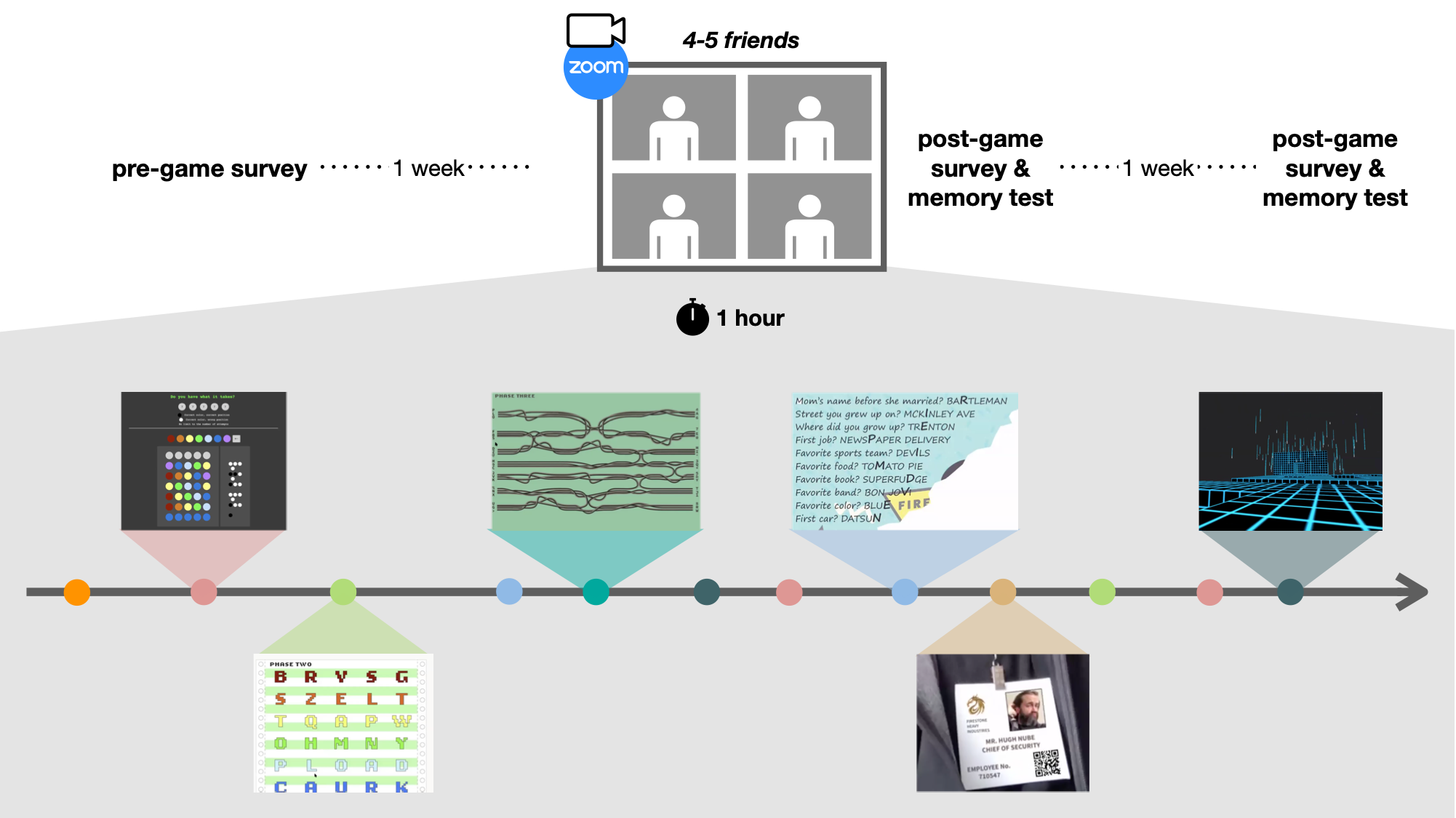Motivated impressions for other people
How would you react if you found out that your partner has been unfaithful? Or that the slacker in your high school class is now immensely successful? We make predictions about how people will act all the time - what happens when those predictions are wrong? In order to form cohesive representations of others, we often need to integrate conflicting information about them. Furthermore, our pre-existing feelings towards these people, as well as our motivations and goals, influence how and when we update our beliefs about them.
This process can happen in a number of different contexts. For example, when you witness a close friend in a novel environment, you may witness them act in novel ways. To investigate this phenomenon, we had groups of friends assess each other before and after completing a virtual escape room together. In another study, I analyzed tweets about public figures accused of sexual assault to understand how people change their perceptions of others’ morality when they commit a moral violation. I’ve also investigated the interdependence of impression updating with others’ perceptions of us by examining the role of mentalizing brain regions in evaluating romantic interest.
These three studies were the basis of my Ph.D. dissertation, which you can read here.
 A schematic of the virtual escape room study. Image made by Wangjing Yu, a collaborator on the project.
A schematic of the virtual escape room study. Image made by Wangjing Yu, a collaborator on the project.
Related work
Silver, B.M., Baldassano, C., Davachi, L., Ochsner, K.N. (in prep). The mentalizing network updates neural representations of romantic interest in response to social feedback. https://doi.org/10.31219/osf.io/3tc4m_v1
Silver, B.M., Yu, W., Davachi, L., Ochsner, K.N. (2025). What are my friends really like? How we change our perceptions of familiar others’ traits and actions. Personality and Social Psychology Bulletin. https://doi.org/10.1177/01461672251320476
Silver, B.M., Ochsner, K.N. (2024). Changes in Online Moral Discourse About Public Figures During #MeToo. Affec Sci. https://doi.org/10.1007/s42761-024-00250-4
Abstracts from the 2022 Annual Meeting of the Society for Affective Science. Affec Sci (2023). https://doi.org/10.1007/s42761-022-00175-w
Silver, B.M., Baldassano, C., Davachi, L., Ochsner, K.N. Always on my mind: The role of the dmPFC in responding to social feedback from potential romantic partners. Poster presented at the Social and Affective Neuroscience Society. Toronto, ON. 2024. View my poster here.
Silver, B.M., Baldassano, C., Davachi, L., Ochsner, K.N. Do you like me back? Impression formation and motivated memory for potential romantic partners. Poster presented at the Social and Affective Neuroscience Society. Santa Barbara, CA. 2023. View my poster here.
Silver, B.M., Yu, W., Davachi, L., Ochsner, K.N. What are my friends really like? Motivated perceptions after completing a virtual escape room. Poster presented at the Society for Affective Science. Long Beach, CA. 2023. View my poster here.
Silver, B.M., Baldassano, C., Davachi, L., Ochsner, K.N. Romantic remembering: Social information determines individualized reward value and motivates memory. Poster presented at the Social and Affective Neuroscience Society. Online. 2022.
Silver, B.M., Ochsner, K.N. Morality and #MeToo: Motivated impression updating on Twitter. Flash talk presented at the Society for Affective Science; Online. 2022.
Self-perception over time
Is the person you are now the person you were five years ago?
It’s possible to update one’s beliefs about oneself: What did we used to be like, and when/how/why did we change? The self-concept can change in response to any number of events: significant personal events such as entering college, or large societal events like a presidential election. Different types of events will cause changes to different facets of the self-concept. In addition, these events can alter our ability to remember what we used to be like.
I have investigated these questions using the 2020 U.S. presidential election. Using data collected both before and after the election, I ask how the election altered people’s traits and values, as well as their ability to remember their past traits and values. Currently, I’m running a replication and extension of that study with the 2024 election.
Related work
Silver, B.M., Meyer, M.L., Davachi, L., Ochsner, K.N. (in revisions). “Did I really used to be like that?” Self-views and memory across the 2020 U.S. presidential election. https://doi.org/10.31234/osf.io/pq4k5
Motivated beliefs online
Have you ever changed your beliefs because of something you read online?
The online world is filled with information - most true, some not - and our motivations impact whether and how we incorporate that information into our world view. I’m interested in how we can apply models of motivated belief change about other people to information encountered in the online world. In addition, I’m interested in what tools or aspects of the online world can we target to most effectively stop the spread of misinformation.
Across a series of studies, I am examining how people perceive artificial intelligence moderators when they moderate misinformation sent in closed group chats. I’m interested in how the nature of the group - its size, or the participant’s relationship to people in it - as well as the nature of the information - the moderator’s emotionality, the information’s ambiguity - influence belief updating online.
Related work
Silver, B.M., Williams-Ceci, S., Naaman, M. Perceptions of AI moderators in private group chats. Flash talk presented at the 6 College Conference. New York, NY.
Silver, B. M., Williams-Ceci, S., & Naaman, M. (2025). AI is Perceived as Less Trustworthy and Less Effective when Using Emotional Arguments to Moderate Misinformation. In CHI EA ‘25: Extended Abstracts of the CHI Conference on Human Factors in Computing Systems (Association for Computing Machinery). https://doi.org/10.1145/3706599.3720008
Silver, B.M., Williams-Ceci, S., Naaman, M. Perceptions of AI moderators and the spread of misinformation in closed group chats. Flash talk presented at the Psychology of Technology conference. Boston, MA. 2024.